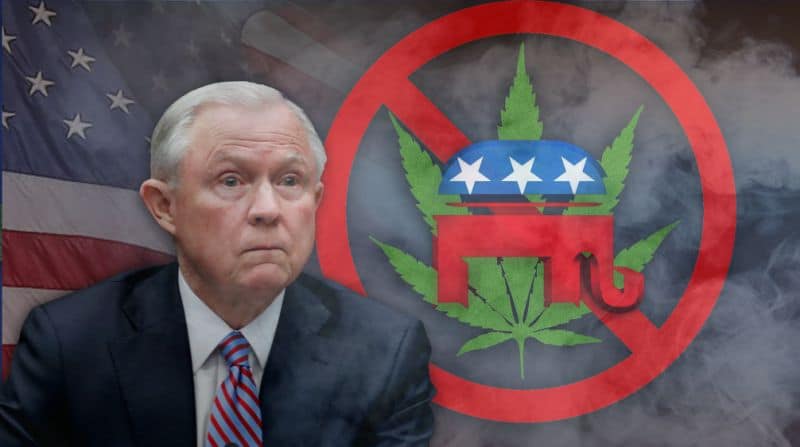The Trump Justice Department’s crackdown on legalized marijuana could be an issue in this year’s midterms — if Democrats choose to make it one.
Multiple outlets reported Thursday that Attorney General Jeff Sessions and the Trump administration were rolling back an Obama era policy to scale back federal prosecution of marijuana-related cases in jurisdictions where it is not illegal under state law. A majority of states — including California, as of Jan. 1 — allow pot use in at least some circumstances, but the growing, selling and possession of marijuana are still federal crimes.
The move, which reflects long-standing Republican antipathy to drug use going back to the 1960s, and Sessions’s own view of weed as only “slightly less awful” than heroin, is unlikely to be popular with the solid majority — 64 percent — of Americans who support pot legalization. An October Gallup poll found that for the first time in the organization’s history of asking about the issue a majority of Republicans supported legalization, along with 67 percent of independents and 72 percent of Democrats. President Trump himself said during his campaign that he would leave marijuana policy to the states, and Republican senators including Lisa Murkowski (whose state, Alaska, has legalized pot) and Rand Paul (the Senate’s leading libertarian and states’-rights advocate) came out against Sessions’s decision. Sen. Cory Gardner of Colorado, a state that has also legalized pot, was particularly outspoken, threatening to block Justice Department appointments unless Sessions reverses himself.

Sen. Cory Gardner, R-Colo., arrives in the Capitol for a vote on Thursday. (Photo: Bill Clark/CQ Roll Call via Getty Images)
Gardner also warned that the decision could redound against Republicans in this year’s midterm elections, coming on the heels of several other unpopular initiatives by the White House and the Republican-controlled Congress, including the failed health care bill and the new tax law. Last month Trump’s appointees to the Federal Communications Commission voted to eliminate net neutrality, a decision with which 83 percent of Americans disagreed. Combined with the low favorability ratings of Trump, Republicans are considered at risk of losing control of at least one house of Congress.
Will weed become another wedge issue for Democrats? Legalization has proved popular at the polls, with eight of the nine 2016 ballot measures passing, including in four states — Arkansas, Florida, Montana and North Dakota — that voted for Trump. (Those four states all voted to approve medical marijuana, not recreational use.) The measure in California to legalize pot was extremely popular among young and African-American voters, two groups Democrats hope to get to the polls in their attempt to win back control of Congress, governorships and state houses.
The 2017 off-year election also saw a resounding victory for Democrat Phil Murphy in the New Jersey gubernatorial race. Murphy was an outspoken supporter of legalizing recreational weed use in the state.
For Democrats, forcing their Republican opponents to choose between backing an unpopular policy or breaking ranks with the White House is an appealing prospect.
Despite being pushed from Democratic governors and activists, President Barack Obama declined to reclassify marijuana during his eight years in office, leaving it as a Schedule 1 drug in the same group with LSD and heroin. Obama said the reclassification was a job for Congress, but there was a process by which the executive branch could have taken steps to change it. Obama’s Drug Enforcement Agency ruled that marijuana had no medicinal value, disappointing reform advocates who had hoped Obama, who used pot himself in his youth, would do more to help the legalization cause while in office.

Phil Murphy, Governor-elect of New Jersey, and Shiela Oliver, Lieutenant Governor-elect, wave to supporters at their election night victory rally in Asbury Park, New Jersey on November 7, 2017. (Photo: Dominick Reuter/Reuters)
The 2016 Democratic platform included language about a “pathway” to legalization, but it barely passed the platform committee meeting and wasn’t a talking point for the Hillary Clinton campaign.
Fifteen Democratic representatives sponsored legislation in February 2017 that would remove marijuana as a Schedule 1 drug under the Controlled Substances Act. Sen. Cory Booker, D-N.J., and Sen. Kirsten Gillibrand, D-N.Y., proposed legislation in 2015 that would legalize medicinal marijuana at the federal level. Booker went further and authored a bill last year to fully legalize weed. He and Gillibrand are both potential Democratic candidates for president in 2020, along with Sen. Bernie Sanders, I-Vt., who also supports decriminalizing pot.

Photo illustration: Yahoo News; photos: Getty Images, AP








































































































